Your digital footprint is your new CV

Every day, all of us are building a profile of who we are online – everyone who uses the internet leaves a digital footprint. Many of us don’t realise that we are doing it, or the potential implications that our online presence can have, and most importantly, many of us don’t realise just how public that online presence is. No matter what you do online, it is important that you understand the trail of data that you are leaving and the effect that this trail could have on you.
What is a digital footprint?
Your digital footprint is the data that you leave by your online activity. A ‘passive’ footprint is one that we leave unintentionally, for example just by clicking on websites. In such cases, the server that you visit may log your IP address and location. Your passive footprint also includes your search history, where is it saved by the search engine that you are using. Your ‘active’ footprint is the information that you intentionally submit online, such as emails, social media profiles, posts and comments, private messaging, blogs, photo and video sharing. Whilst your digital footprint is not necessarily something to worry about, it should be something that you give careful consideration to because it builds a picture of your behaviour online. The ability for others to not only see, but share, copy and save information that you submit online means that you cannot control what stays online even after original messages, emails, posts and comments may have been removed.
Is it a problem?
A poor digital reputation can not only affect your relationships, but it can also affect your job prospects. A recent study by Career Builder showed that 70 percent of employers use social media to screen candidates during the hiring process, so it is very important that you are aware of the image that you are creating of yourself online. Using online data to build a profile of you can be more subtle than just looking for undesirable conduct and character traits – prospective employers will use social media to learn more about your language, views and opinions and ultimately make judgements on whether you are a good culture fit for their organisation.
Why should you manage it?
Anyone wanting to protect their personal and professional reputation should be seeking to manage their digital footprint. Your actions today, tomorrow or next week online may not particularly impact you at the time, but it could matter months or even years down the line. Sharing pictures and images that don’t present you in the best light, making derogatory comments (particularly about a current or previous employer) or even trolling people online, are very common negative behaviours on social media. Even using poor language and grammar can have a negative impact. A survey by Talent Culture in 2015 revealed that 48% of hiring managers who used social media to screen a candidate found a compelling reason not to hire them.
How do you manage it?
Cleaning up your digital reputation is not always easy, but it is possible. The first thing you should do is Google yourself and see what comes up. This will give you a quick indication as to whether your footprint is negative or positive and you can take steps to try to get anything negative removed, or in the case of social media, have a clean-up and a review of your privacy settings. You might not be able to completely erase negative online history, but you can take steps to build a better reputation for yourself over time. In future, stop and think about anything that you post or send online and remember to treat people online as you would wish to be treated. Watch out for inappropriate posts and comments that you are tagged in and remove tags. Social media has many positive benefits, such as education, awareness, information and help, and a positive digital footprint can be a great benefit, especially in helping you to build a respected professional reputation. Be creative and articulate, share ideas and tips and just be friendly and sociable!
And just because we love a good moral – remember this: There’s no taking something back once it’s online, so think twice before you click!

